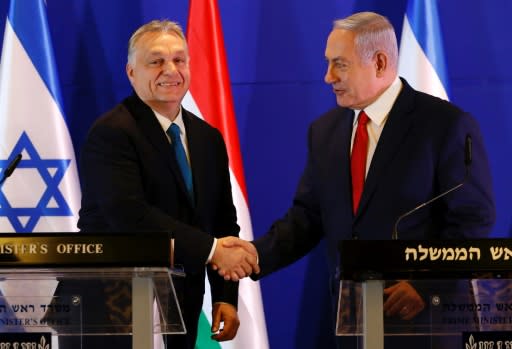Netanyahu seeks to save face after cancelled central Europe summit
Israeli Prime Minister Benjamin Netanyahu sought to save face Tuesday after a summit with four central European nations was cancelled over a Holocaust-linked dispute with Poland, instead holding meetings with the remaining three leaders. The dispute dented Netanyahu's attempts to forge deeper links with all four countries as part of his strategy to build alliances with governments that strongly back Israel within the European Union. Netanyahu frequently lashes out at what he calls the EU's "hypocritical and hostile attitude", referring to the bloc's criticism of Israel's treatment of the Palestinians. The holding of a summit of the Visegrad group -- Slovakia, Poland, Hungary and the Czech Republic -- in Jerusalem had been seen as a coup for Netanyahu's efforts. But the highly sensitive question of Poles' role in the Holocaust, the subject of a previous diplomatic dispute with Israel, loomed over preparations for the meeting. The dispute flared again last week, when Netanyahu visited Warsaw for a summit on the Middle East and was quoted as saying "the Poles collaborated with the Nazis," sparking Polish anger. Netanyahu's office said later that he was misquoted and had not implicated all Poles or the Polish nation in the Holocaust. But Poland later downgraded its participation in the summit, saying it would send its foreign minister. Israel's new foreign minister Israel Katz added fuel to the fire on Sunday, telling an Israeli television station "there were many Poles who collaborated with the Nazis." He also quoted late Israeli prime minister Yitzhak Shamir saying "Poles suckle anti-Semitism with their mothers' milk." Polish Prime Minister Mateusz Morawiecki called the comments "racist and unacceptable" and pulled his country out of the summit altogether. On Tuesday, senior Polish officials demanded Israel apologise. The summit was postponed to the second half of the year at Poland's request, according to Slovakia. Warsaw has long been at pains to state that Poland, which was occupied by Nazi Germany, did not collaborate in the Holocaust -- although individual Poles gave up Jews to the Nazis. - Israelis criticise strategy - Netanyahu met the prime ministers of Slovakia, the Czech Republic and Hungary individually on Tuesday in Jerusalem before a joint lunch. Hungarian Prime Minister Viktor Orban said he hoped the full summit would take place in Jerusalem at a later date. He and Slovak Prime Minister Peter Pellegrini spoke of plans to open offices in Jerusalem: a Slovak cultural, information and innovation centre and a Hungarian trade office. Last year, the Czech Republic opened a Czech House in Jerusalem for tourism and trade. Netanyahu has urged countries to follow the example of US President Donald Trump and move their embassies to Jerusalem from Tel Aviv. But the European Union, like most of the world, believes the status of the disputed city, at the heart of the Israeli-Palestinian conflict, must first be settled in peace talks between the two sides. The fresh controversy in Polish-Israeli ties follows a row last year over a Polish law that made it illegal to accuse the Polish nation or state of complicity in Nazi German crimes. After protests from Israel and the US, Poland amended the law to remove the possibility of fines or a prison sentence. Netanyahu then agreed to drop the issue, sparking criticism at home -- including from Israel's Yad Vashem Holocaust memorial and research centre. Netanyahu's relations with leaders such as Orban has also drawn criticism. Orban's visit to Israel in July provoked concern because of allegations he has stoked anti-Semitism in Hungary with nationalist rhetoric and a campaign against US Jewish billionaire philanthropist George Soros. But Netanyahu has highlighted Hungary's pledged support for Israel, and both men have been at odds with the EU establishment. When attending a Visegrad group summit in Hungary in 2017, Netanyahu was overheard, in closed-door remarks picked up by a microphone, denouncing EU demands of Israel as "absolutely crazy". Jonathan Rynhold, police science professor at Israel's Bar-Ilan University, said Netanyahu's strategy "is to work with the central and eastern countries, the Visegrad group, to neutralise pressures coming from other parts of the EU, particularly Brussels". "I think he overrates what he is getting from it, and he underrates the cost in Jewish terms with being associated" with some of the countries, he said. Israeli Prime Minister Benjamin Netanyahu's strategy of wooing central and eastern European EU member states has been dented by comments he made in Warsaw last week about the role of Poles in the Holocaust Warsaw has long been at pains to state that Poland, which was occupied by Nazi Germany, did not collaborate in the Holocaust although individual Poles did give up Jews to the Nazis Israeli Prime Minister Benjamin Netanyahu has drawn criticism for wooing Hungarian counterpart Viktor Orban (L) who is accused of stoking anti-Semitism in Hungary with nationalist rhetoric and a campaign against US Jewish philanthropist George Soros




